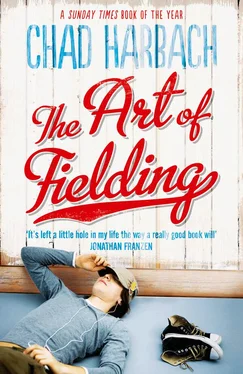Henry nodded, unconvinced. “I know.”
“Goddamn Dunne.” Coach Cox kept his eyes on the bikini-clad Catholic girls on TV, who were testing the novitiates’ faith with back rubs. “I’m going to wring his scrawny neck.”
A door opened. “Guert Affenlight?” called a young woman in pale-blue scrubs, reading the name off her clipboard.
“Yes.” Affenlight stood and straightened his Harpooner tie.
“My name is Dr. Collins. Are you a relative of Owen Dunne?”
“Oh, no,” Affenlight said. “His family, actually, is from, um . . .”
“San Jose,” Henry said.
“Right,” Affenlight said quickly. “San Jose.” He’d felt such stupid pride at having the doctor call his name, as if he were the person nearest to Owen. The doctor turned to address herself to Henry:
“Your friend isn’t doing too badly, all in all. The CT showed no epidural bleeding, which is what we worry about in this kind of case. He has a severe concussion and a fractured zygomatic arch — that is, a cheekbone. His functions appear normal. The arch will require reconstructive surgery, which I imagine we’ll try to do right away, as long as we’ve got him here.” Dr. Collins, who despite the purple fatigue marks under her eyes looked no older than twenty-five, paused to pluck at the V of her scrub top, above which her skin was Irishly pink and mottled. Affenlight saw, or imagined he saw, her tired eyes settle on Henry in an interested way.
“Can I see him?” Henry asked.
Dr. Collins shook her head. “His concussion’s pretty severe, and we’re going to keep him in the ICU tonight. He seems to be suffering some short-term memory loss, which we assume will clear. Tomorrow you can see him all you like.” She patted Henry consolingly on the arm.
Affenlight’s cell phone shivered against his thigh. The number was unfamiliar, with a 312 prefix, but he knew who it would be. He made an apologetic gesture toward the doctor, who didn’t notice, and walked into the hall. “Pella. Kiddo. Where are you?”
“Chicago. I made my connection. We’re about to board, so I should be right on time.” Her voice sounded thin and crackly through the pay-phone static. “I thought maybe we could go to Bau Kitchen.”
This was Pella’s favorite restaurant in Milwaukee, the place where they’d celebrated her sixteenth birthday. If Affenlight had been zipping down I-43 toward the airport, an Italian opera tucked into the Audi’s CD player, he would have been heartened by this suggestion, which seemed like a gesture of peace. Instead he was bound to be late, and he couldn’t help wondering whether Pella had already sniffed out his neglect, or what was bound to seem like neglect, and had decided to punish him with solicitude. “That’s a wonderful idea,” he said. “But I’m afraid I’m running a little late.”
“Oh.”
Disappointment, fragility, the phrase picking up where we left off— these things and more came streaming through the phone line’s silence. “I’m at the hospital,” Affenlight said, trying to ward them off. “We’ve had an accident at the school. I’ll be there as soon as I can.”
“Sure,” Pella said. “Whenever.”
As he hurried out, Affenlight paused long enough to buy a pack of cigarettes — Parliaments, his old standby — from the hospital gift shop. A hospital that sold cigarettes: he rolled this notion in his head, wondering whether it spelled doom or hope, while he thrust a twenty at the gray-haired woman behind the counter. He shoved the pack in his pocket and tried to leave without his change, but she summoned him back and insisted on counting out, with excruciating and perhaps remonstrative slowness, a ten, five ones, and several coins. Coach Cox drove him to his car, and he rocketed down the empty interstate, Le Nozze di Figaro blasting, windows down.
Chapter 10
Pella left San Francisco with only a floppy, cane-handled wicker bag that contained whatever remained from her last trip to the beach nine months ago, a useless assortment of crap — sunglasses, tampons, gummy worms, sand — to which she’d added nothing but her wallet and a black bathing suit, designed for serious swimming.
As the plane slipped up the narrow industrial corridor that connected Chicago to Milwaukee, the darkness of Lake Michigan spread beyond the starboard windows, she was already beginning to regret not having packed a suitcase. It was the kind of overly emphatic gesture she was famous for, at least in her own mind, and should have outgrown by now. Maybe she’d thought it would make the break with David cleaner, easier, more decisive: See, I don’t need you. I don’t need anything. Not even underwear. She hadn’t bothered to remember that there was nowhere decent to shop near the so-called city of Westish, Wisconsin.
How stupid she felt, to feel this bad, to feel her life lying around her in ruins, and yet to have no story to tell about it. Sure, in some abstract sense it was a story, or would someday become one . . . Yes, I was married once. I dropped out of high school, ran off with an architect who’d come to lecture at my prep school. I was a senior, had just turned nineteen. David was thirty-one. At the end of his week at Tellman Rose, I slept with him. One of us was going to sleep with him, and as the reigning alpha female I had first dibs. I had dated older guys — high school guys when I was in junior high, college guys when I was at Tellman Rose, a few starving-artist types on trips to Boston or New York — but David was something new to my experience. A man, full stop.
A bit of a weenie, perhaps — petulant, conniving, prim. But that’s a retrospective analysis. At the time I just saw the charm and cultivation, the dark twinkling eyes above the brown beard, the immense learning. And more than those things, I saw the virtue. He was a man who lived by a code. He thought classical learning was important, and so he’d become an excellent classical scholar, though it was only indirectly useful to his practice. Which was itself a model of virtue: an attempt to create classically beautiful buildings that were, you know, green. This wasn’t a man who watched TV, went to the gym, wasted time. He didn’t eat meat and he drank only to show off his knowledge of wine.
I was attuned to his every move as he delivered his afternoon lectures, as he held forth at various luncheons and dinners, to which I always managed to be invited. Clearly I had a daddy thing going on, even more than usual. He possessed the three qualities I associated most closely with my father — learned, virtuous, flummoxed by me — and he displayed them all much more conspicuously, not to say pretentiously, than my dad ever had. My dad was cool. David was like my dad but not cool at all. One of the TR girls, not my main rival but the one I feared most, because she was as smart as I was, referred to me as Pellektra. I couldn’t complain; it was too spot-on, her tone too light. You’re only Jung once, I replied. Enjoy it.
Because of David’s virtue, his virtuous self-image, I had to present myself as the seducer. Which I did, a project that culminated the night before his departure. I felt as if I’d deflowered him, not because he was inept compared to other guys — again, he was thirty-one — but because he maintained that facade of virtue until the last. You’re awfully stiff, I said right before we kissed — my last best double entendre of the night.
A week later was spring break. I’d just gotten into Yale. My friends and I were going to Jamaica to drink. We were at the Burlington airport, already drinking. David walked in. He had a bag over his shoulder, two tickets to Rome in his hand. Shall we? he said. He was sweating, plotting, a turtleneck under his jacket, anxious about my answer — not cool.
My break was a week long, but we stayed in Rome for three. Afterward we flew to San Francisco, where David’s latest project was located; I felt elated, like I’d bypassed Yale and young adulthood and graduated straight into the world. When I recall those first weeks with David among the crumbling buildings of Rome, weeks of feeling deliciously older than old, giddy with my own seriousness, it’s probably no accident that I can’t think of my life without using the word ruined.
Читать дальше










